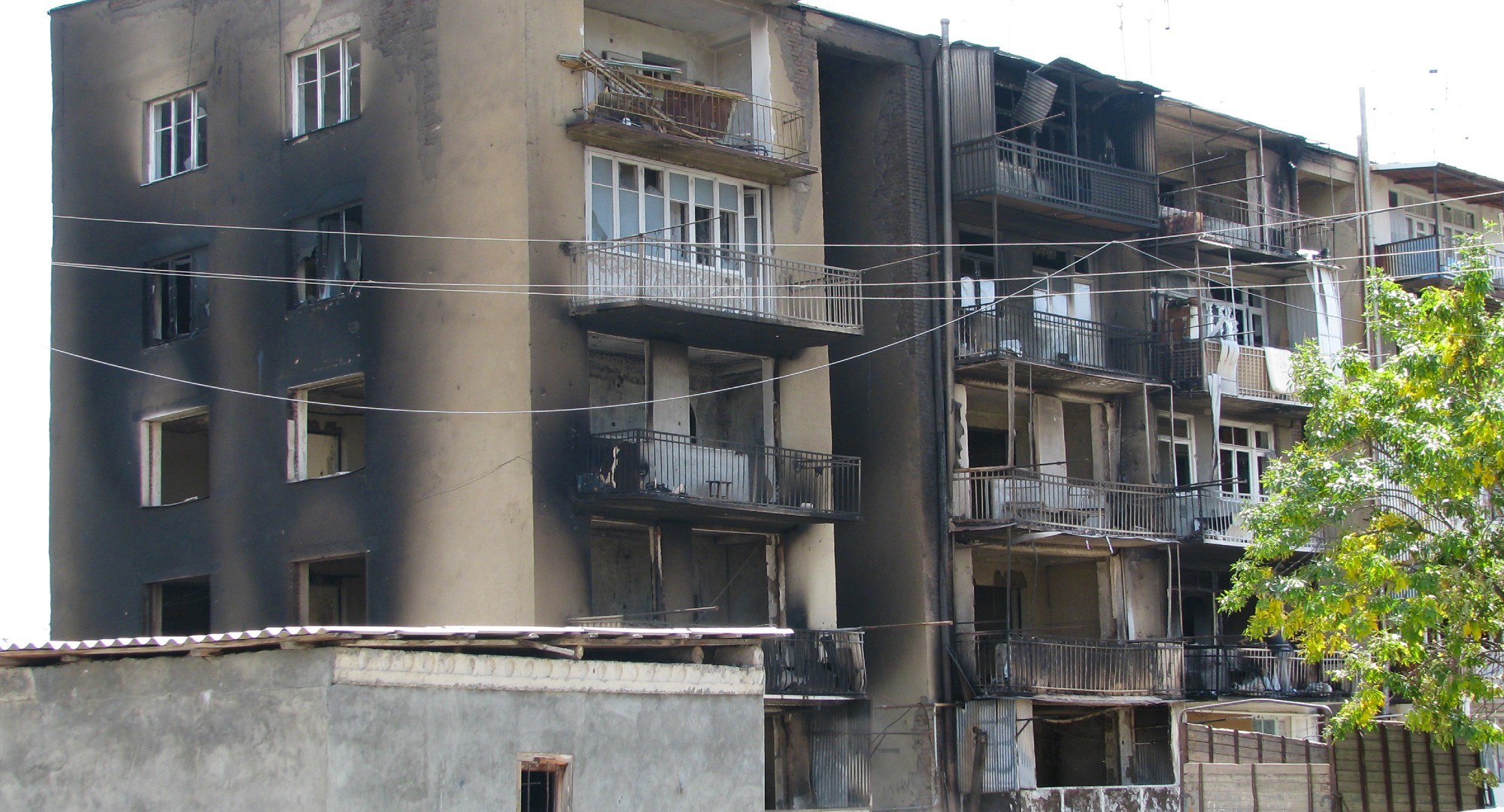
White Cloth (Brassard) | Aslan, Tskhinval [ENG]
24.09.2020 | 7 Min to readAslan, 34 Years old, Tskhinval. August, 2008.
The first time I processed that the war had started was on 5th of August. I was standing in the yard with my friends. We didn’t have water for two or three weeks and right at that minute the water truck came. They cut the pipes in the Georgian village. We were helping people, we helped collect the water and then hauled it to their homes. When one family got into their car and left for North Ossetia right in front of me, I realized there was it: the war.
I was a student then. On August 7th, I went to the volunteer office with my friends, there were fifteen of us asking to volunteer. In turn, they told us to get the sleeping bags and mattresses from storage and set up a barrack. It took us a whole day and after our meal, we heard artillery shells coming from the Khetagauri side.
They distributed arms on the 7th. It was either 9 or 10 pm at night. The republic’s president, Eudard Jabaevichi (Kokoity), came to the base and told us that Georgian side had announced they were ending all hostilities in the surrounding areas in the villages on the border, so we should go home, it wasn’t necessary for everyone to be on their shift. My house was 100 or 200 meters away. I went and had supper, but in the end, I called my friend and returned to the base. We heard the first explosion about 11. When I looked out, I realized they were shooting at “Spider.”
We were in the library’s basement until morning. They turned the volunteer office into an unused kindergarten. The building didn’t have a basement or any place to take shelter. Around 5pm, the firings stopped. I ran home thinking to see my family since they weren’t answering my calls. My mother, sister, grandmother, and brother were waiting for me when I got there. Where are you? I yelled out. They called back from the basement. I felt relieved. Then I went back out again.
We got an order to go show up at the hotel „Alani.” When we arrived, there were about 30 people there. They divided us into two. They ordered us to go towards Tbeti which is 1-2 kilometers from Tskhinval. There was a defense base in one of the houses, we loaded up there. The head of volunteers ordered us to stand with Omonians at the entrance of Khetagurovi. We went. I was with my friend who had an RPG, and I had shells. There was no fortification at all, neither trenches, we stood in the ditch on the side of the road. Soon we saw Georgian tanks, shootings started. They came at us with artillery.
Some were wounded, but not deeply. My friend was hit in the leg. The attack didn’t last long. We realized we weren’t going to beat tanks. We left our position and headed back to the city. These weren’t thought out actions, we just ended up at „Alani.” We were greeted with many volunteers from different regions, but we didn't learn anything new. They asked me what was happening. Georgian tanks were entering the city, I said. We didn’t get any orders, there was no coordination. I am going to the peacekeepers, I said. They were close to the restaurant. I arrived and everything was bombed out, totally destroyed.
We went from one building to the next. I was looking for my wounded friend. I found out on the 9th of August, he was fine. I stopped by the house to check in. I would periodically war.
On the 9th of August they told us to tie white cloth on our arms. They said that in the city there were diverse groups, some Georgians were presenting themselves as Ossetian over the walkie-talkies, and they ordered rescue groups from different neighborhoods. There was information on gunners. We heard that there was a terrible attack by School 12.
Georgian army attacked us on 9th of August after lunch. Before that, my friend called me to tell me his aunt had died, the house was bombed. He wasn’t there, he has been disabled since childhood. They lived on our street, three houses over. We went and buried her in the vineyard. The Archbishop of the Diocese of Alan, Father Alexander, also met us there. He either said a few words or a prayer, I can’t remember. It was impossible to keep every ritual for the dead, there was a war on, but we did have to bury her. We heard the relentless buzzing of the shells, every minute we could have been hit. This murdered woman’s mother was very old, she couldn’t walk on her own. She sat by the house and watched us bury her daughter. Father Alexander was saying, God please save our people while I was thinking what would come of this grave. Would it stay there or would it ever be dignified and transported to the cemetery?
_______________________________________________________
From the series “Rebuilding Memories for future- South Ossetia 1991/2008”
Text: Zarina Sanakoeva



